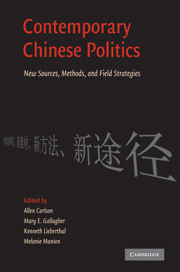Book contents
- Frontmatter
- Contents
- Tables and Figures
- Contributors
- Abbreviations
- Introduction
- Part I Sources
- 1 State-Generated Data and Contentious Politics in China
- 2 Why Archives?
- 3 The Central Committee, Past and Present
- 4 Experimental Methods and Psychological Measures in the Study of Chinese Foreign Policy
- 5 Internet Resources and the Study of Chinese Foreign Relations
- 6 Information Overload?
- Part II Qualitative Methods
- Part III Survey Methods
- Reflections on the Evolution of the China Field in Political Science
- Glossary
- References
- Index
3 - The Central Committee, Past and Present
A Method of Quantifying Elite Biographies
Published online by Cambridge University Press: 05 June 2012
- Frontmatter
- Contents
- Tables and Figures
- Contributors
- Abbreviations
- Introduction
- Part I Sources
- 1 State-Generated Data and Contentious Politics in China
- 2 Why Archives?
- 3 The Central Committee, Past and Present
- 4 Experimental Methods and Psychological Measures in the Study of Chinese Foreign Policy
- 5 Internet Resources and the Study of Chinese Foreign Relations
- 6 Information Overload?
- Part II Qualitative Methods
- Part III Survey Methods
- Reflections on the Evolution of the China Field in Political Science
- Glossary
- References
- Index
Summary
The political elite was an early focus of Western analysis of the People’s Republic of China, partly because information about the elite was relatively available in the opaque political system. As China opened up, information about all aspects of Chinese politics became increasingly available, thus decreasing the relative importance of elite studies in China. In this chapter, we first argue that elite studies continue to be important and necessary for understanding authoritarian regimes like China. Further, we introduce a dataset of Central Committee (CC) members that combines traditional elite studies with new coding and statistical methodologies. The data are used to trace several basic characteristics of the CC through the entire history of the Chinese Communist Party (CCP), and to measure the relative influence of Hu Yaobang and Hua Guofeng in the CC. We further discuss the potential of this dataset for providing more systematic evidence of how elite characteristics and elite conflict affect policy and political outcomes in China.
Elite Studies in Authoritarian Regimes
At a time when China was sealed off from the rest of the world, Western scholars of China relied mainly on the official press and in some cases military sources from Taiwan to make scholarly inferences. As the heroic deeds and – at times – the “errors” of senior leaders were often the foci of official press coverage, Western scholars naturally made extensive use of this relatively abundant source of information, thus creating a heavy emphasis on the elite. Today, China scholars have a wide range of sources available to them, ranging from internal government documents to interviews to survey instruments. The proliferation of new sources has given rise to the study of grassroots-level political phenomena in China and a decline in the relative importance of elite studies. However, the authoritarian nature of the Chinese regime provides compelling reason to continue elite studies.
- Type
- Chapter
- Information
- Contemporary Chinese PoliticsNew Sources, Methods, and Field Strategies, pp. 51 - 68Publisher: Cambridge University PressPrint publication year: 2010
- 9
- Cited by

